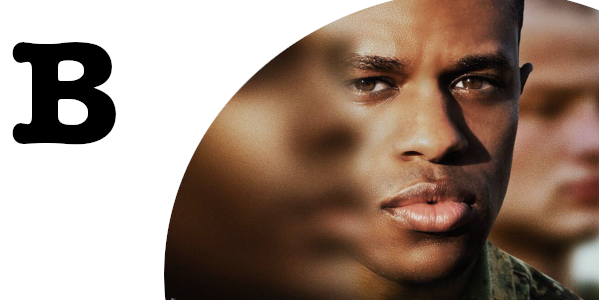 As we move further and further away from the jingoistic and patriotic portrayals of our most recent war, a new portrait has begun to emerge. While the concept of war has always been examined and questioned through the lens of a camera, recent depictions of the War of Terror have started to examine further the flames that many stoke in order to populate their fighting machine. The Inspection is just that, an investigation into how far those in charge will go to break someone, or transform them into killers.
As we move further and further away from the jingoistic and patriotic portrayals of our most recent war, a new portrait has begun to emerge. While the concept of war has always been examined and questioned through the lens of a camera, recent depictions of the War of Terror have started to examine further the flames that many stoke in order to populate their fighting machine. The Inspection is just that, an investigation into how far those in charge will go to break someone, or transform them into killers.
Rejected by his own mother, a young gay man, Ellis French, enlists in the Marine Corps and winds up at a boot Camp in South Carolina. While he initially meets the physical requirements, his sexuality quickly draws the ire of his instructor and fellow recruits, making him a target of near-lethal hazing throughout his training.
The Inspection goes through every grueling and degrading moment of basic training with little pause. There’s a method to it, a sense of tried and true tradition to severe physical and mental abuse that follows French (as he’s known throughout most of the film) around every corner. Whether it’s sanctioned or just ignored by those in charge, the results remain the same: an isolating, cold world for French.
And the center to making it all work is the performance from Jeremy Pope, who continues to show why he’s a star in waiting. This story is very much based on the real life experience of writer and director Elegance Bratton, and it seems Pope has put all his effort into portraying these events as best he can. As French, Pope balances a line of valiance. At any given moment, one can see his valiant nature in enduring it all or rebelling against the machine.
As far as war films go, The Inspection is far more understated than its counterparts. There are no big emotional speeches, no send-offs for the recruits who burned out and left, and no semblance of a position on whether this is all just a necessity of warfare. French’s loud and abusive drill sergeant Laws has decided to make it his mission to create soldiers, by any means necessary, but does the problem lie in him? Or is it a symptom of the time tested military complex? The film seems unsure, leaving the audience to examine it on their own terms after the credits roll.
This is not a film that’s trying to paint the War on Terror with a broad brush, speaking to one artists specific experience instead in Elegance Bratton. And rather than providing answers to ideas of violence and war, Bratton seeks to explore other themes, like how far someone will go, and how much they’ll endure, to find some form of acceptance.


No comments :
Post a Comment